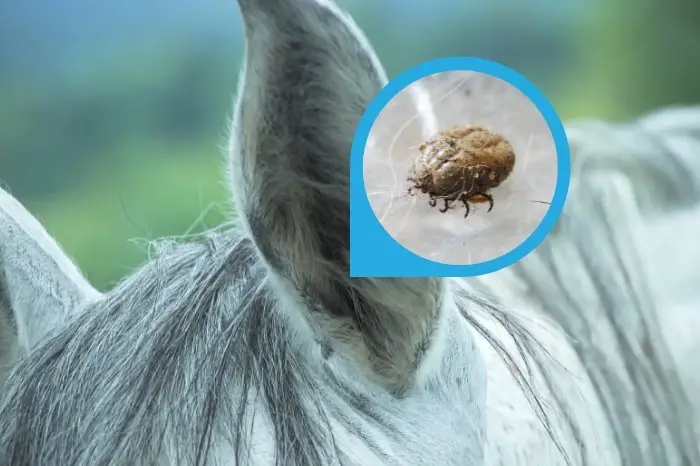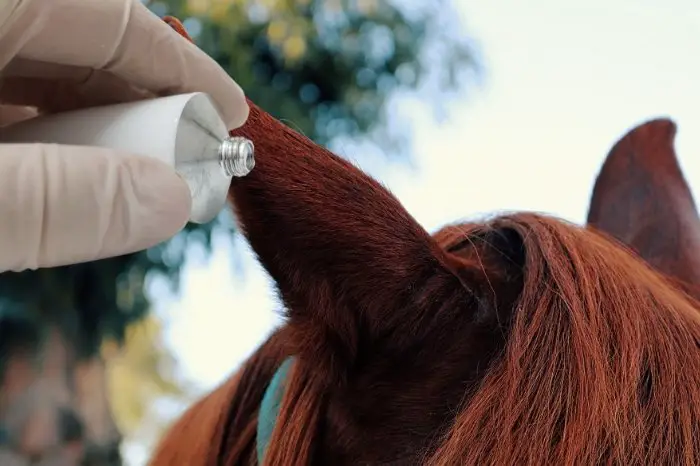Last Updated on August 3, 2022
Are you worried that your horse might have ear mites? Treating lice and mites in horses can be difficult. And finding the best horse ear mites treatment may be a challenge. Keep reading to find out everything you need to know about treating ear mites in horses.
What Are Ear Mites In Horses?
Luckily, ear mites are rare in horses, but they can occur. The thought of mites makes everyone feel a bit squeamish, and no doubt you’ll be itching by the time you finish reading this article! But if you suspect that your horse might have ear mites, keep reading to find out everything you need to know about the best horse ear mites treatment.
Mites are tiny insects that live on the skin of animals. There are many different types of mites, and each one has a preference for a particular host animal. Different mites like to live in different locations on the animal as well.

Click Here to Get Info About:
Psoroptes Cuniculi
Horses have a few different types of mites, and the most common mites in horses are found either on the body or on the legs and in the mane and tail. However, there is one type of mite that likes to colonize the ears of horses, which can cause some serious problems.
Interestingly, the type of mite found in the ears of horses is more commonly found in rabbits. This is a type of mite called Psoroptes cuniculi. Your veterinarian will be able to give a definitive diagnosis of ear mites in horses by analyzing these mites under a microscope.
Some horses will have ear mites without showing any symptoms at all, whilst others will have some classic clinical signs. The most common symptom of ear mites in horses is head shaking, or a horse that is head shy.
The mites also cause intense itching of the skin inside the ears and the horse will rub their head to try and alleviate this itching. This can cause the horse to lose hair around the ears and make the skin red and raw. In severe cases, the ear will droop and may get bruised so badly that it fills with blood.
As a horse owner, it can be difficult to get a diagnosis of ear mites without the help of a veterinarian. This is because horses do not like having their ears touched and handled, even if they do not have ear mites. It is normally necessary to sedate a horse to facilitate a full examination of the ear.
Ivermectin Paste – Horse Wormer 1 Tube 6.08 Grams
Once the horse is sedated, the inside of the air can be visually inspected with a light and magnifying glass. A sample of the skin and secretions inside the air may be taken using either a swab or a gloved finger. The ear wax will be examined for the presence of mites, which appear as tiny white spots that move slowly on the surface.
What Is The Best Horse Ear Mites Treatment?
Although ear mites in horses were once common, luckily in the modern world they are now relatively rare. The reason for this is that one group of equine wormers called ivermectins is also effective against ear mites. These wormers work systemically, so when the mites suck on the blood from the skin inside the ears, they are killed.
So if your horse has a mild case of ear mites, your veterinarian may prescribe treatment as simple as giving an ivermectin wormer. Most severe infestations may require additional treatment, such as cleaning the ears and applying topical medication.
There is currently no licensed topical medication for the treatment of ear mites in horses, but veterinarians can prescribe other medications that may be used off license. This can include medications more normally used to treat fleas in dogs and cats containing a drug called pyrethrin, also known as Frontline. Ivermectin can also be prescribed to use as a topical medication.
Administering medication to the air of a horse can be tricky, and it should normally be done under sedation. If performed incorrectly, permanent damage to the ear canal can occur. Sedation also reduces the level of stress and discomfort to the horse and will reduce the risk of it becoming head shy.

Summary – Horse Ear Mites Treatment
So, as we have learned, the best horse ear mite treatment is is to use a systemic horse wormer containing ivermectin. Severe cases of ear mites in horses can be treated with topical medications as well. Incorrect administration of medication can cause damage to the ear canal, so veterinary advice must always be sought.
We’d love to hear your thoughts on horse ear mites treatment and management. Do you have a horse that suffers from mites no matter what you do? Or maybe you found a natural horse ear mite treatment that really works? Leave a comment below and we’ll get back to you!
FAQ’s

Kate Chalmers is a qualified veterinary nurse who has specialized in horse care for the vast majority of her career. She has been around horses since she was a child, starting out riding ponies and helping out at the local stables before going on to college to study Horse Care & Management. She has backed and trained many horses during her lifetime and competed in various equestrian sports at different levels.
After Kate qualified as a veterinary nurse, she provided nursing care to the patients of a large equine veterinary hospital for many years. She then went on to teach horse care and veterinary nursing at one of the top colleges in the country. This has led to an in-depth knowledge of the care needs of horses and their various medical ailments, as well as a life-long passion for educating horse owners on how to provide the best possible care for their four-legged friends.
Kate Chalmers BSc (Hons) CVN, Dip AVN (Equine) Dip HE CVN EVN VN A1 PGCE

